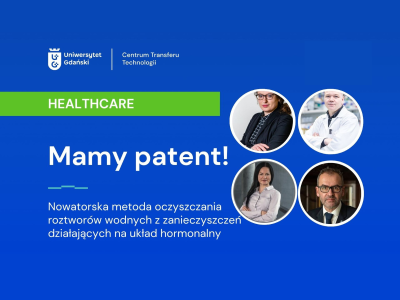
A team of scientists from the Intercollegiate Faculty of Biotechnology at the University of Gdańsk and the Medical University of Gdańsk, as well as the Faculty of Chemistry at the University of Gdańsk, has obtained a patent for an invention concerning the deactivation of endocrine-active compounds in aqueous solutions, which was developed in cooperation with researchers from the Wrocław University of Technology. This innovative method reduces the cost of purifying surface water from biologically active compounds (including, for example, drug residues) and degrades these compounds safely, without the use of additional chemicals or high temperatures. The invention can be used, among others, in the pharmaceutical industry and agriculture, leading to a reduction in the negative impact of this type of infrastructure on the natural environment.
The proposed method involves the use of so-called non-thermal atmospheric pressure plasma. The process takes place using a specially designed system in which a flowing aqueous solution is exposed to cold plasma generated in air at atmospheric pressure by initiating a glow discharge. The innovation of the method is related, among other things, to the continuous and flow-through nature of the reaction-discharge system, the possibility of simultaneous and effective removal of at least 7 different biologically active pollutants, and the lack of need to use noble discharge gases, which reduces the costs of the entire process.
The invention contributes to solving the problem of environmental pollution, including surface waters, with endocrine-disrupting chemicals (EDCs), enabling their effective degradation in a process that does not require the use of harmful substances such as reducing agents or oxidising agents.
The research team from the University of Gdańsk included dr Agata Motyka-Pomagruk and dr hab. inż. Wojciech Śledź from the Department of Plant Protection and Biotechnology of the Intercollegiate Faculty of Biotechnology of the University of Gdańsk and the Medical University of Gdańsk, as well as dr hab. Magda Caban, prof. UG and prof. dr hab. Piotr Stepnowski from the Faculty of Chemistry at the University of Gdańsk. The work of the entire team was supervised by dr hab. inż. Anna Dzimitrowicz, prof. PWr from the Wrocław University of Technology.
‘Cold atmospheric plasma is a promising technology for wastewater treatment, offering many advantages over traditional methods, including high efficiency, environmental safety and ease of use,’ says dr hab. Magda Caban, prof. UG. ‘The small amount of by-products generated is not harmful, and the process usually leads to complete mineralisation of organic compounds.’
Among the advantages of this innovative solution, Prof. M. Caban lists:
- the possibility of scaling the solution and adapting it to specific needs (amount of wastewater produced)
- the continuous nature of the process and low maintenance costs
- no need to supply additional reagents to the system or create special pressure and temperature conditions
- the possibility of applying the process to low and high concentrations of endocrine disruptors
- in addition to removing endocrine disruptors, it is possible to remove bacteria and resistance genes
Legal protection for this innovative solution was provided by experts from the Technology Transfer Office at the University of Gdańsk.
